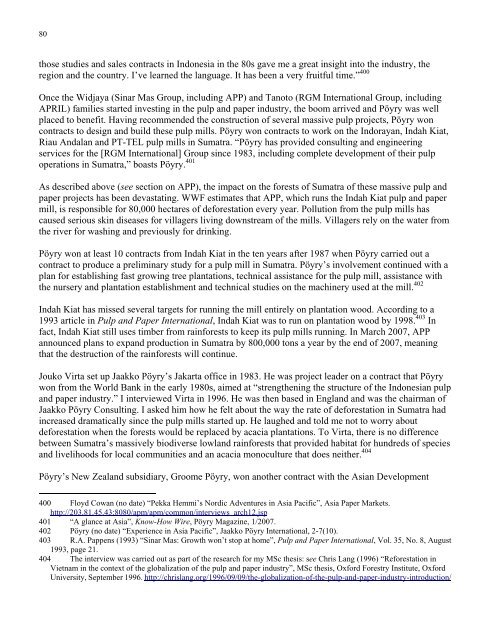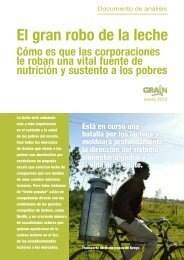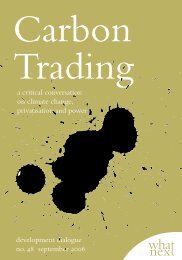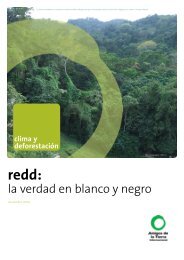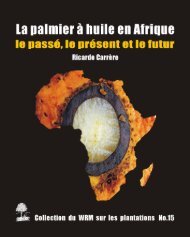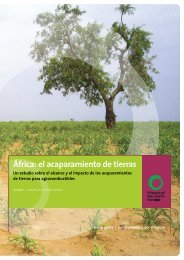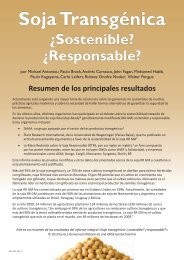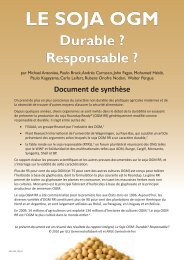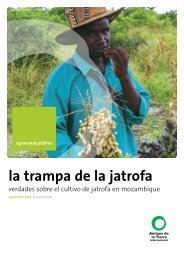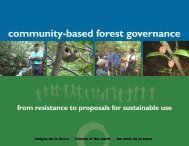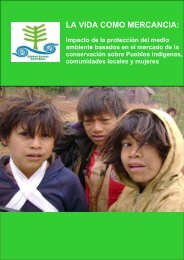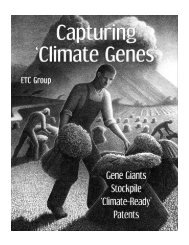Plantations, poverty and power - Critical Information Collective
Plantations, poverty and power - Critical Information Collective
Plantations, poverty and power - Critical Information Collective
Create successful ePaper yourself
Turn your PDF publications into a flip-book with our unique Google optimized e-Paper software.
80<br />
those studies <strong>and</strong> sales contracts in Indonesia in the 80s gave me a great insight into the industry, the<br />
region <strong>and</strong> the country. I’ve learned the language. It has been a very fruitful time.” 400<br />
Once the Widjaya (Sinar Mas Group, including APP) <strong>and</strong> Tanoto (RGM International Group, including<br />
APRIL) families started investing in the pulp <strong>and</strong> paper industry, the boom arrived <strong>and</strong> Pöyry was well<br />
placed to benefit. Having recommended the construction of several massive pulp projects, Pöyry won<br />
contracts to design <strong>and</strong> build these pulp mills. Pöyry won contracts to work on the Indorayan, Indah Kiat,<br />
Riau Andalan <strong>and</strong> PT-TEL pulp mills in Sumatra. “Pöyry has provided consulting <strong>and</strong> engineering<br />
services for the [RGM International] Group since 1983, including complete development of their pulp<br />
operations in Sumatra,” boasts Pöyry. 401<br />
As described above (see section on APP), the impact on the forests of Sumatra of these massive pulp <strong>and</strong><br />
paper projects has been devastating. WWF estimates that APP, which runs the Indah Kiat pulp <strong>and</strong> paper<br />
mill, is responsible for 80,000 hectares of deforestation every year. Pollution from the pulp mills has<br />
caused serious skin diseases for villagers living downstream of the mills. Villagers rely on the water from<br />
the river for washing <strong>and</strong> previously for drinking.<br />
Pöyry won at least 10 contracts from Indah Kiat in the ten years after 1987 when Pöyry carried out a<br />
contract to produce a preliminary study for a pulp mill in Sumatra. Pöyry’s involvement continued with a<br />
plan for establishing fast growing tree plantations, technical assistance for the pulp mill, assistance with<br />
the nursery <strong>and</strong> plantation establishment <strong>and</strong> technical studies on the machinery used at the mill. 402<br />
Indah Kiat has missed several targets for running the mill entirely on plantation wood. According to a<br />
1993 article in Pulp <strong>and</strong> Paper International, Indah Kiat was to run on plantation wood by 1998. 403 In<br />
fact, Indah Kiat still uses timber from rainforests to keep its pulp mills running. In March 2007, APP<br />
announced plans to exp<strong>and</strong> production in Sumatra by 800,000 tons a year by the end of 2007, meaning<br />
that the destruction of the rainforests will continue.<br />
Jouko Virta set up Jaakko Pöyry’s Jakarta office in 1983. He was project leader on a contract that Pöyry<br />
won from the World Bank in the early 1980s, aimed at “strengthening the structure of the Indonesian pulp<br />
<strong>and</strong> paper industry.” I interviewed Virta in 1996. He was then based in Engl<strong>and</strong> <strong>and</strong> was the chairman of<br />
Jaakko Pöyry Consulting. I asked him how he felt about the way the rate of deforestation in Sumatra had<br />
increased dramatically since the pulp mills started up. He laughed <strong>and</strong> told me not to worry about<br />
deforestation when the forests would be replaced by acacia plantations. To Virta, there is no difference<br />
between Sumatra’s massively biodiverse lowl<strong>and</strong> rainforests that provided habitat for hundreds of species<br />
<strong>and</strong> livelihoods for local communities <strong>and</strong> an acacia monoculture that does neither. 404<br />
Pöyry’s New Zeal<strong>and</strong> subsidiary, Groome Pöyry, won another contract with the Asian Development<br />
400 Floyd Cowan (no date) “Pekka Hemmi’s Nordic Adventures in Asia Pacific”, Asia Paper Markets.<br />
http://203.81.45.43:8080/apm/apm/common/interviews_arch12.jsp<br />
401 “A glance at Asia”, Know-How Wire, Pöyry Magazine, 1/2007.<br />
402 Pöyry (no date) “Experience in Asia Pacific”, Jaakko Pöyry International, 2-7(10).<br />
403 R.A. Pappens (1993) “Sinar Mas: Growth won’t stop at home”, Pulp <strong>and</strong> Paper International, Vol. 35, No. 8, August<br />
1993, page 21.<br />
404 The interview was carried out as part of the research for my MSc thesis: see Chris Lang (1996) “Reforestation in<br />
Vietnam in the context of the globalization of the pulp <strong>and</strong> paper industry”, MSc thesis, Oxford Forestry Institute, Oxford<br />
University, September 1996. http://chrislang.org/1996/09/09/the-globalization-of-the-pulp-<strong>and</strong>-paper-industry-introduction/


